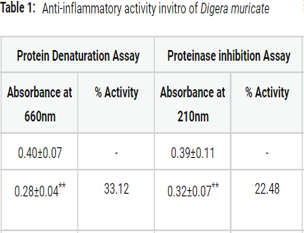Abstract
Inflammation is a process that is generally termed for pain and redness, which includes swelling. But it is defined as a heterogeneous group of processes which result in the pain and increase in vascular circulation and denaturation of protein that results in tissue degeneration. There are many synthetic drugs available to treat and relieve the inflammation. They are potent and have many side effects too. So there is an increased search for alternative means of treatment option. Thereby there was a high focus on the medicinal plants and herbs. Digera muricate, which is used to treat many diseases like analgesic activity, antidiabetic activity and anticancer activity too, this plant has proven to possess the antioxidant potential also. So there is no enough work done to verify the inflammatory potential of the plant. This was the primary consideration for this research to select the plant to prove it has anti-inflammatory potential. Having in the account that the ethical problems in the usage of lab animals, the anti-inflammatory potential of the plant was evaluated in-vitro using enzyme inhibition assays. The in-vitro models of the inflammatory activity are used for testing the anti-inflammatory activity, and the results were not different from invivo models. The extracts showed a dose based rise in the action, and the plant process a better anti-inflammatory activity than the standard drugs.
Full text article
Authors

This work is licensed under a Creative Commons Attribution-NonCommercial-NoDerivatives 4.0 International License.

